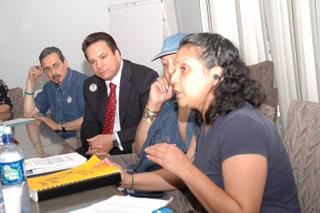"Over rivers of stone and ancient ocean beds,
I walk on sandals of twine and tire treads,
My pockets full of dust,
My mouth filled with cool stone.
The pale moon opens the earth to its bones;
Meet me on the Matamoros banks."
-Bruce Springsteen, "Matamoros Banks"
Every year, thousands of
migrants without authorization cross the US border with Mexico seeking a new life, a job, a way to support their families. Some don’t make it. Since 1994, over 2,500 deaths have occurred. The actual death rate, however, is likely to be higher as many are never found and some that are found are not reported. They die of dehydration, of exposure, from the heat of the desert. Recently, with the return of triple digit temperatures, deaths are again being reported in the Arizona desert.
“Come and Look at My Brother in His Coffin”
Jose Luis Hernandez Aguirre tried desperately to find work in the maquiladora plants near Mexicali but was unable to do so. With a wife and two children, ages one and seven, Jose needed to find a job that would put food on the table. A smuggler told him of the high-paying jobs across the border and offered, for $1,000, to take him there. Joined by his brother Jaime and several others, the group headed for the United States with hope. After one day, his brother Jaime called and reported to the family and Jose’s sister, Sonia, that Jose was lost. Jaime could not make the trek in the desert, but Jose wanted to continue on the journey. Four days later, Jose’s body was found in the desert. His sister Sonia borrowed a truck to retrieve Jose’s remains. Upon her return, she encountered another group of migrants heading to the United States. “Why do you want to risk your lives like this?” she implored. “Come and look at my brother in his coffin.” (Strangers No Longer: Together on the Journey of Hope, USCCB, January 22, 2003)
What would drive someone to such desperate measures – to an uncertain future, to give a lifetime’s saving to a coyote to smuggle them across the border, perhaps to suffocate in an overcrowded boxcar or van or in the trunk of a car?
Current migration to the United States from Latin America is largely motivated by economic necessity as well as social and political considerations. Jose in the story above was unable to find work – he hoped to find a way to support his family and this need drove him to his death. Each year, other migrants, desperately seek refuge in the US; seek a piece of the American dream, or perhaps just some money to send home. At a recent talk in Tucson, Bishop Gerald Kicanas spoke movingly about an experience during a recent trip to Mexico.
"I stopped in the church in Altar which is situated just off the square where large numbers of young migrants, wearing knapsacks wander, waiting for the right opportunity to venture north. As I entered the church, I noticed a number of young men scattered around the church. Some were sitting, some kneeling. As I watched some signed themselves with the sign of the cross. Some were mumbling prayers aloud. I looked at their faces. They seemed scared, determined, desperate. They sought God’s help. I wished that those who look on these migrants as 'illegals,' 'criminals,' even 'terrorists' could see that they were just the poor wanting a decent way of life, a job, some way to support their family. Work drives them north. Love for their families drive them north. A decent human life drives them north." (Most Reverend Gerald Kicanas, Conference on Trade, Tucson, Arizona, April 15, 2005)
The reasons for the lack of economic opportunity in Mexico and other countries in Latin America are many including economic and development models that have been unable to help the poor. The implementation of trade policies such as NAFTA has negatively impacted the poor, particularly in rural areas. Mexican farmers find it difficult to compete with the low prices of highly subsidized agricultural industry in the US. Recently, with the Dominican Republic-Central American (DR-CAFTA) trade agreement due to be ratified, the US Conference of Catholic Bishops has been calling on Congress to evaluate the agreement not just on economics, but on a set of ethical principals such as how it affects the livelihoods of small producers and impoverished people, workers rights and the environment.
Migrants at the border are often treated as criminals by civil authorities. Rather than significantly reducing illegal crossings, an increased militarization by border patrol agents has pushed migrants to take routes in which their lives may be in danger and have increased smuggling operations. In addition, recently, at the Arizona/Mexico border, a highly armed citizen group, the “Minutemen” lined the border determined to stop the flow of immigrants into the United States. Their goals, they said, were to provide national security. They are not the first such group and are seeking to extend their reach into California.
Interestingly, according to a recent study on immigration by
Working Partnerships USA of San Jose, heightened militarization at the border actually increased the number of undocumented immigrants living in California.
[1]. When crossing the border became more difficult and the risk of traveling back and forth each year could no longer be justified, these immigrants settled in the US permanently. Essentially, it has been counterproductive. This report also outlines the many positive contributions that immigrants have made to the local and state economy.
We are a nation of immigrants, yet every day thousands of immigrants are suffering; families are separated, often for years until they can legally be reunited. US residents, who want to reunite with family members, must often wait 10, 15 or more years before visas for their relatives become available. This situation is unacceptable and goes against our values and Catholic Social Teaching. Regardless of their legal status, migrants, like all persons, possess inherent human dignity that must be respected. Catholic Social Teaching affirms the right of the United States to protect national security and control its borders, but only insofar as the control over the border promotes the common good. The common good is not served when the basic human rights of the individual are violated.
It is estimated that between 8 and 10 million people in the US live on the margins of society for lack of proper documentation. Border enforcement strategies have resulted in thousands of deaths. A growing public anti-immigrant sentiment has led to more restrictive immigration laws and policies. Additionally, root causes and conditions that compel people to leave their homes out of desperation and a lack of opportunities must be addressed if an effective immigration policy is to be achieved.
To address these concerns, the United States Conference of Catholic Bishops along with a coalition of 20 Catholic groups is calling for a comprehensive program of immigration reform. Saying that the nation’s immigration system is “broken and badly needs repair,” Justice for Immigrants: A Journey of Hope was officially launched on May 10, 2005 in Washington, DC.
The four goals of the Campaign are:
· To educate Catholics about the benefits of immigration and immigrants to the nation.
· To strengthen public opinion about the positive contributions of immigrants.
· To advocate for just immigration laws that promote legal status and other protections for immigrant workers and their families.
· To organize Catholic legal networks to assist immigrants to access the benefits of any reforms in immigration law.
For additional information on the Catholic Campaign for Immigration Reform, see the website:
Justice for ImmigrantsTo learn more about this campaign in the Diocese of San Jose, please contact Linda Batton at (408) 983-0158 or by email at
batton@dsj.org or any member of the Diocesan Human Concerns Commission.
Key Documents for Further Study -· “
For the Dignity of the Land, For the Dignity of Mexico,” by the Mexican Conference of Bishops, January 29, 2003.
· “
Strangers No Longer: A Journey of Hope,” US Conference of Catholic Bishops and Conferencia del Episcopado Mexicano, January 22, 2003.
[1] The Economic Effects of Immigration in Santa Clara County and California, Louise Auerhahn and Bob Brownstein, Working Partnerships USA, September 2004.





 Each year as part the annual mission co-op appeal, each parish in the diocese is assigned a missionary group or diocese to visit over a weekend during the months of July-September.
Each year as part the annual mission co-op appeal, each parish in the diocese is assigned a missionary group or diocese to visit over a weekend during the months of July-September.




